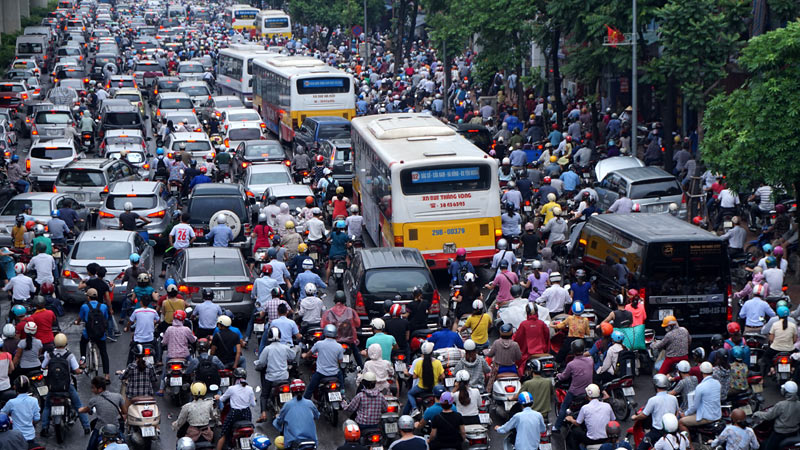[ad_1]

Hanoi will strictly control motorbikes in 2018
Hanoi is still struggling to curb the development of cars and motorcycles, which is believed to be the major reason behind serious air pollution in the city.
The air quality index recorded at the air monitoring station at the US Embassy in Hanoi was 121 in 2016, higher than the permitted level of 100.
The number of motorcycles has been increasing rapidly, from 1 million in late 1990s to over 5.2 million today. Motorbikes are the most popular means of transport for locals. As the city’s population soars, the number of private vehicles in operation has continued to rise rapidly.
However, as the number of motorbikes has been increasing more rapidly, it has become one of the major reasons behind traffic jams and pollution.
At present, there are only regulations on managing motorbike quality but none about use on roads.
|
Hanoi will have 6.1 million motorbikes by 2020, 7 million by 2025 and 7.5 million by 2030. The Transport Department believes that it is necessary to take drastic measures to restrict the number operating on streets. |
Hanoi will have 6.1 million motorbikes by 2020, 7 million by 2025 and 7.5 million by 2030. The Transport Department believes that it is necessary to take drastic measures to restrict the number operating on streets.
Other cities in the region have done the same. The authorities of Jakarta, with high density of motorbikes (26.4 million motorbikes in 2013) and high death toll from traffic accidents in 2015, began prohibiting motorbikes to enter some central routes. Guangzhou authorities began prohibiting motorbikes 10 years ago.
Hanoi has drawn up a roadmap on restricting and prohibiting motorbikes which will be implemented step by step.
In 2018-2020, the city will take measures to deal with motorbikes which cannot satisfy technical requirements.
After 2020, these motorbikes will be disposed of. In 2025-2029, motorbikes will be prohibited in certain hours and on certain days in some districts and major routes. From 2030, motorbikes will not be allowed in any district.
Analysts estimate that the decision will directly affect more than 50 percent of people living in Hanoi and people from other provinces, as well as motorbike dealers and manufacturers.
However, the latest survey conducted by the Institute for Transport Development Strategy found that the majority of people support the decision, provided that the city develops public means of transport. Hanoi will have to develop public transport systems in parallel with reducing private vehicles.
RELATED NEWS
Hanoi to revoke outdated motorbikes to curb pollution
Hanoi authorities again raise controversial motorbike ban
Hoang Xuan
[ad_2]
Source link
